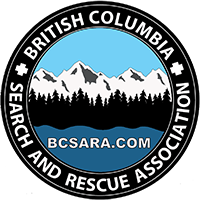The British Columbia Search and Rescue Association (BCSARA) recognizes that industry does engage paid rescue services in remote regions of the province, as part of their responsibilities as employers as set out by WorkSafe BC. Ground Search and Rescue Volunteers have and continue to respond to rescue and transport injured workers where private services are not available or if other specialized techniques are required. However, we do not support a position of paid rescue services for citizens and visitors recreating in British Columbia for many reasons.
The following outlines our position on search and rescue:
- The local police (RCMP and municipal police) are responsible for lost and missing persons, BC Emergency Heath Services is responsible for pre-hospital care and transportation of injured persons. By calling 911 the appropriate agency is engaged and ensures their resources are involved in a timely manner including requesting GSAR volunteers to respond.
• BCSARA members make up the 78 provincially recognized ground search and rescue (GSAR) groups in the province who are run by over 2,500 well trained individuals. They are located throughout British Columbia and cover 100% of the province. - BCSARA members respond 24 hours a day, 7 days a week, 365 days a year, in good weather and bad.
- Rescues can become extremely complex. Bad weather, mechanical issues or night fall depending on the aircraft, pilot and company may ground a helicopter for hours. GSAR volunteers ensure backup plans are in place and a response by ground or water will already be ready to go if needed. Situations can change some rescues from a helicopter extract to a stretcher carry lasting several hours. GSAR groups are resourced to do this.
- GSAR volunteers work closely with other GSAR groups and organizations whose members will respond to assist, including air and marine resources, through a process called mutual aid.
- The 79 GSAR groups know their response areas intimately and, in most cases, will have shorter travel times and the requisite skills and equipment to respond to incidents that are normally encountered. The common use of mutual aid allows for a larger pool of SAR members with different skillsets to meet the demands of SAR calls.
- While reports come in that a person in the backcountry is injured, the location provided is not always correct or known. Even emergency locator beacons have been known to be out by several hundred meters. The ability to effectively search for an injured subject is a primary skill of GSAR volunteers.
- BCSARA volunteers dedicate hundreds of hours each year to promoting messages from AdventureSmart to help educate the public on how to safely enjoy BC’s great outdoors.
- Last year, BCSARA members responded to over 1,900 calls to assist approximately 2,100 people. Not one of those calls was the same.
BCSARA’s biggest concern is the confusion this change in service will create for the public potentially delaying essential help. Hints of having to pay for a rescue have already had tragic consequences in the past. Promoting a paid service to rescue injured outdoor recreationalists is going to confuse the public even more. No one should ever be concerned whether they have enough insurance to cover the cost of a search or a rescue. Search and rescue in BC is free and is provided by highly trained volunteers throughout the province. If you or someone you care about needs assistance, simply call 911.
